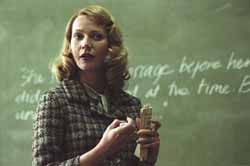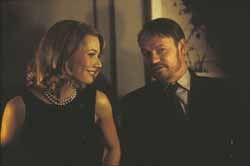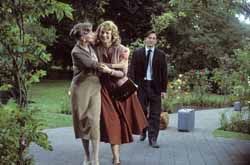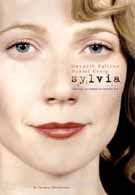Sylvia Plath was a complicated woman. She, who once famously said: "Dying is an art, like everything else. I do it exceptionally well," was, indeed, quite complicated as both artist and lover. Yet for all her emotional pleas for passion and poetic prose, Plath was also a woman of unbridled talent. Arguably, the most prolific female poet of the 20th century, Plath?s most enduring legacy should well have been The Bell Jar or even Ariel¯a collection of poems written prior to her untimely death in 1963¯but it?s her tumultuous marriage to Ted Hughes that has frequently overshadowed her creative genius. Now, thanks to Sylvia, an Oscar worthy biopic by New Zealand director Christine Jeffs, a compelling portrait of Sylvia Plath has finally surfaced, shedding new light on one of America?s most illusive literary minds.
Sylvia opens in 1956 with Plath (Gwenyth Paltrow), a Fullbright scholar, meeting the charismatic Yorkshire poet, Ted Hughes, (the Byronic Daniel Craig) at a Cambridge party. The two share an erotically charged dance, followed by a passionate kiss and a bloody bite on the cheek, before beginning the most destructive literary relationship this side of Zelda and F. Scott Fitzgerald. Fate, as it seems, had already predestined these two talented wordsmiths to fall in love, and feed off one another?s brilliance. If only temporarily.
After returning to England following a brief teaching stint in Massachusetts, the couple?s marriage is suddenly put to the test, when Sylvia accuses Ted of dallying with a bevy of beautiful British admirers. Ted, who vehemently denies Sylvia?s accusations, convinces her of his undying love and fidelity. At least, until an exotic stranger named Assia Wevill (Amira Casar) saunters into their lives, triggering Sylvia?s worst nightmare, and marking her dark descent into the depths of desperation and betrayal.
Much has been written about Sylvia?s script, including an article in The Guardian by screenwriter John Brownlow, admitting the difficulty he faced in adapting Plath?s multifaceted story for the screen. The film may avoid the inevitable Plath-Hughes facts, such as Sylvia?s grief stricken childhood or Ted?s morbid fascination with mind control and hypnosis, in lieu of the inner workings of an artist and her painful ascent to posthumous stardom. But, don?t let that deter you. For if Sylvia does anything, it?s celebrate a woman who gave so much of herself to love and to literature that she eventually became so overwhelmed by life that she buried her head in a gas oven and asphyxiated herself.
Although, many loyal Plath fans have blamed Hughes for contributing to his wife?s death, the film, however, does not. That?s not to say that Sylvia is completely sympathetic to Hughes. But from all historic indications, it?s an accurate depiction. Jeffs and Brownlow allude to the number of lovers Hughes took during his marriage to Plath. Yet never portray him as a philandering pig. Instead, they show the relationship for it was: a losing battle between an arrogant husband and a jealous wife.
Unfortunately, like so many other writers, Plath was so possessed by the magical incantation of poetry that she often had little or no control over her emotions except through verse. Her poetry, quoted throughout Sylvia from The Colossus and Ariel, describes a woman so full of malaise that her greatest triumph was to convert anguish into art.
Honoring the memory of "Lady Lazarus," Paltrow delivers the most powerful performance of her career, churning out scene-after-scene of pure cinematic gold with a mid-Atlantic accent so close to Plath?s that the two sound like long lost sisters. Digging in her heels and giving viewers a rare glimpse into the fragile world of Sylvia Plath, Paltrow is the embodiment of passionate angst. Though she?s at her most reckless during a dinner party, in which Sylvia comes unhinged following the discovery that Ted has cheated on her with Assia. It?s in those final moments leading up to the suicide, where Paltrow?s at her best, capturing the true essence of Sylvia Plath.






Most Popular




